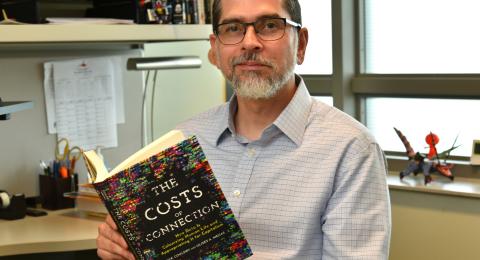New book looks at ‘Costs of Connection’ for personal data online
Office of Communications and Marketing
Published
From invasive social platforms to data breaches, daily headlines paint a cautionary tale of information on the internet, which is explored in depth in a new book, “Costs of Connection,” co-authored by Ulises Mejias of SUNY Oswego’s communication studies faculty and Nick Couldrey of the London School of Economics and Political Science.
“There is a new kind of colonial land grab going on, but it's not for territory or resources; it's for our data,” Mejias explained. “Our social lives are being quantified and converted into data for the benefit of a few, and we argue in this book that this constitutes a new kind of 'data colonialism.'”
The book, published by Stanford University Press, is for “anyone who uses the internet, who has a phone or whose data has been collected by a corporation or the government,” Mejias said. “That's most of us! Although this is an academic book, Nick and I have tried to write in an accessible language, with lots of examples from the past and the present.”
While connecting with others is a positive desire, society has reached the point where the promotion of connecting people, science, medicine and other fields is seen as the only path to progress, the authors noted. However, the resulting massive data collection and related surveillance means that lives are transformed into commodities, and “the data collected and processed when we are connected ... is the means for this transformation,” they write on their website, colonizedbydata.com. Thus, they suggest weighing the costs of all these connections.
Mejias said this collaboration was an outgrowth of his first book, “Off the Network” in 2013, and ongoing conversations with Couldry, a leading media scholar, teacher and a sociologist of media and culture.
While that first book “was about what digital networks, as models and templates for organizing our lives, include and exclude from their structures,” this one represents “a response to a growing uneasiness about what happens when practically everything we do is captured by digital networks, nothing is excluded and social life becomes a direct input to capitalism,” Mejias explained.
Electronic exploitation
“As someone with roots in the Global South, I am also very interested in the history of colonialism, another system that captured people's lives entirely, and I was curious to see if we could use that template to explain the extraction and dispossession going on today,” Mejias said. “Nick and I started to have conversations about this four or five years ago. At that time, I thought we would only write an article. But he thought we should write a whole book, and here we are!”
Mejias realizes that “colonialism” is a heavy word, given some of the actions connected to the traditional definition, but also notes that he finds it the most appropriate term to how companies can cavalierly use personal information for profit.
“The form and the content of this colonialism are different, and we don't want to equate the immense human cost of historical colonialism -- including slavery -- with what is going today,” Mejias explained. “But the function remains the same: to dispossess, to extract for profit and to limit our freedom. Applying the lens of colonialism to Big Data allows us to extend the scale and scope of our analysis, and begin to think of new ways to resist what is going on.”
In the past year, the authors have shared their research in stories and documentaries for the likes of The Economist, Swiss Broadcasting Corporation and Al Jazeera. An article they co-authored on this topic for the journal Television and New Media is,at the time of this writing, the article has the highest attention score of all articles ever published by the journal, and is in the top 5 percent of the 13 million research outputs tracked by Altmetric, Mejias noted.
In part because of the continued currency of the topic, the launch of the book is taking the authors on an international tour, with stops in the U.S. and abroad, including Harvard University, New York University, The New School for Social Research, Temple University, Rutgers University, Universidad Iberoamericana (Mexico City and Puebla campuses), Tecnologico de Monterrey (Mexico City campus) and the London School of Economics. Plans are in the works for more international dates in 2020.



